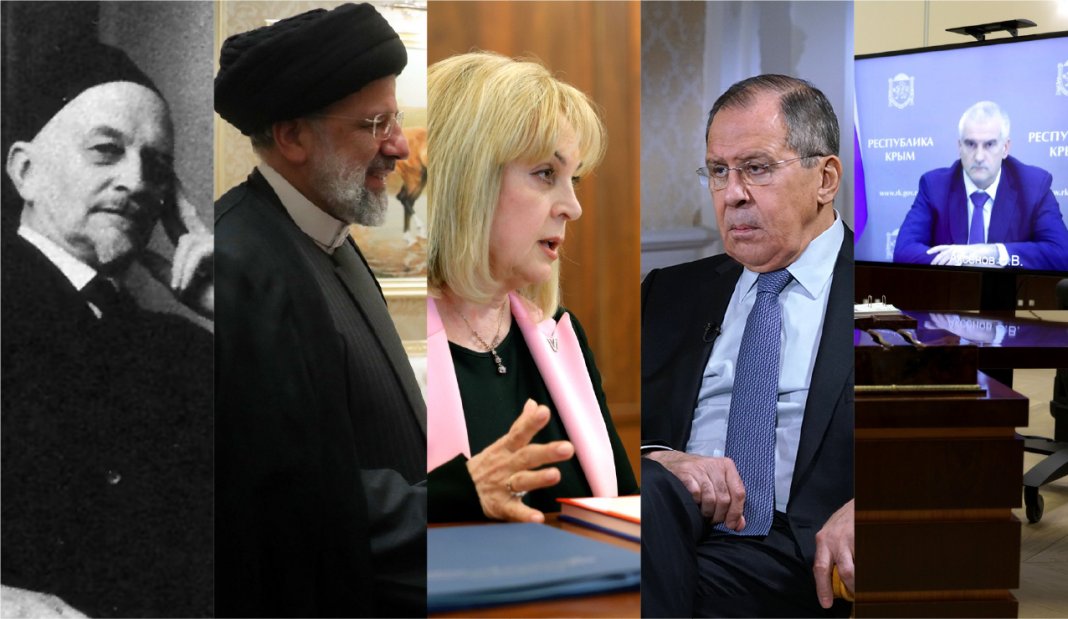This report describes the key events which significantly influenced Russia’s political, economic, and social processes.
Assessing the past week’s results, we determine the following trends:
- Russians believe that true sovereignty is possible only after the transition to one’s own information product, which will mean independence from global corporations that produce software. Russia also plans to sell its own software to “brotherly” countries. In this regard, there are significant problems, since after 2014 and 2022 there was a serious “brain drain” – the best specialists in the IT industry went abroad, and projects like Skolkovo are now going through hard times.
- The next meeting with permanent members of the Security Council is the final touch before the change of Government, which will follow in early May (immediately after the inauguration of Vladimir Putin). That is why there was a need to hear about the actual state of affairs in the economy and the situation with state reserves – that is, what the new Government of the Russian Federation will have to start working with. The fact that the report was entrusted to Dmitry Medvedev, one of the main enemies and opponents of Mikhail Mishustin, is significant.
- In his recent interview, Russian Foreign Minister Sergei Lavrov partially lifted the curtain on the negotiation process on the eve of the start of the Russian-Ukrainian war. In particular, Lavrov claims that Antony Blinken told him in January 2022 about the United States’ desire to deploy American medium-range missiles on Ukrainian territory and was ready to bargain not on the very fact of deployment but on the possible number of missiles. If this is so, then Russia will soon appeal to this fact and try to convince more countries of the Global South of the justice of its aggression since it will present it as “protection of its own national interests.”
This digest covers the following topics, which were the most relevant for Russia between the 15th and the 21st of April:
1. Meeting of Vladimir Putin with the Chairman of the Central Election Commission, Ella Pamfilova;
2. Telephone conversation between Vladimir Putin and Iranian President Ebrahim Raisi;
3. Meeting with members of the Government;
4. Meeting with the “head” of the occupied Autonomous Republic of Crimea;
5. Meeting with permanent members of the Security Council;
6. Interview with Sergei Lavrov.
7. Discussion on the philosopher Ivan Ilyin
This Content Is Only For Subscribers
- Meeting of Vladimir Putin with the Chairman of the Central Election Commission, Ella Pamfilova
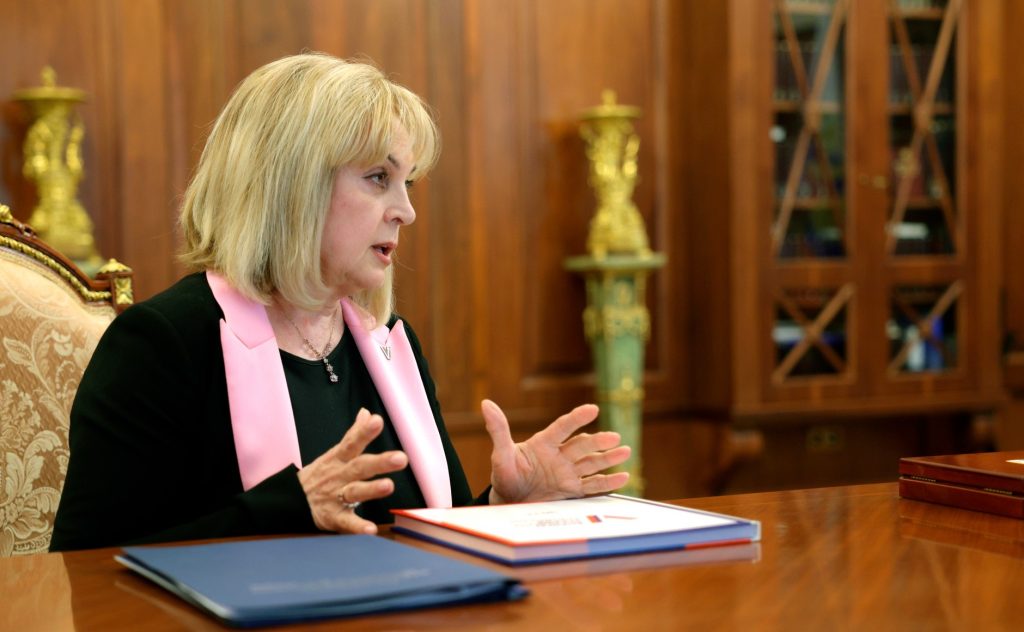
On Tuesday, April 16, Vladimir Putin met with Ella Pamfilova, the Chairman of the Central Election Commission. The main topic of the meeting was Putin’s presentation of a certificate of election as President of the Russian Federation. Putin and Pamfilova also discussed the results of the presidential elections and vote counting. The Russian President thanked Pamfilova and the entire Central Election Commission for their work.
Key theses:
- Putin: “Ella Alexandrovna, thank you and all your colleagues in the Central Election Commission and locally. The work was difficult, I understand, but essential for the country, for the internal stability of the state, especially today.”
- Pamfilova: “Of course, the results of these elections are surprising – they are unprecedented. I was thinking about this: all the numbers are there, Vladimir Vladimirovich, and all the statistics. The most important thing is how wise our people turned out to be. “An unprecedented consolidation of society and an understanding that this is not just a choice of the President, but that this is some important stage in the battle for Russia.”
- Pamfilova: “This time, there was such indecent interference in the process. But we have always been accustomed, for a long time, to standard types of intervention; I don’t even want to talk about it. But along with this, suddenly such ugly forms began to be used; that is, they went to great lengths.”
Outcomes and outlook:
A traditional event, the main goal of which is to consolidate the electoral success of Vladimir Putin in the 2024 presidential elections. After this event, the official inauguration is just a formal ceremonial action.
At the same time, it is important to note that the inauguration itself will be indicative from the point of view of the presence of leaders of other states. Most likely, the Kremlin will try to do everything to ensure that not only the leaders of post-Soviet states, but also individual politicians from the West come to Moscow.
- Telephone conversation between Vladimir Putin and Iranian President Ebrahim Raisi
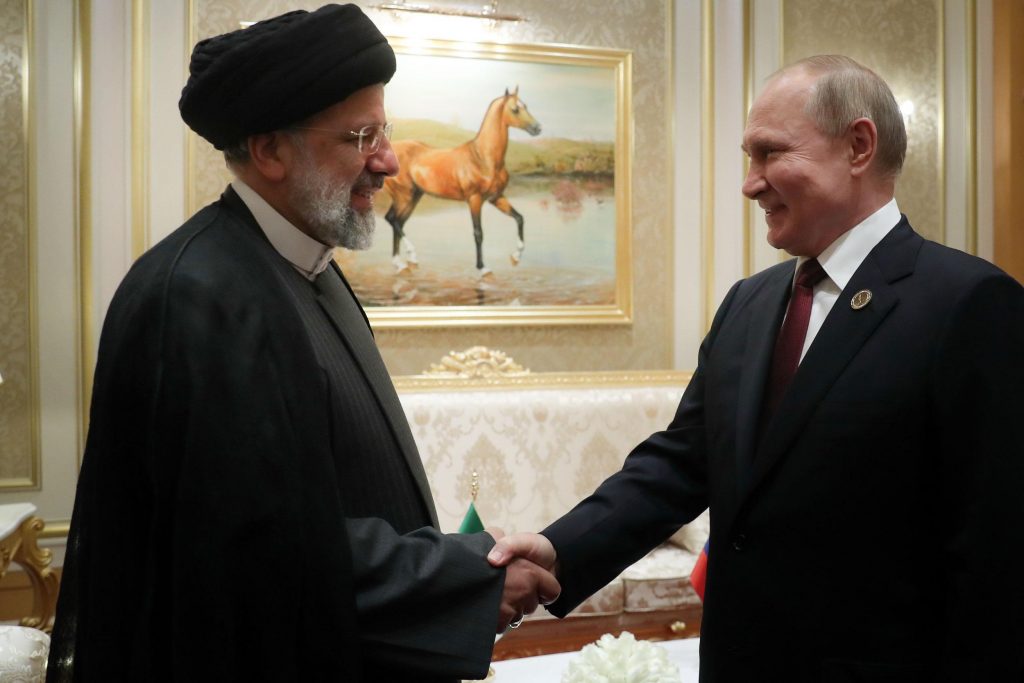
On Tuesday, April 16, at the Russian’s initiative, Vladimir Putin had a telephone conversation with Iranian President Ebrahim Raisi. During the conversation, the parties discussed the aggravation of the situation in the Middle East caused by Israel and Iran’s mutual missile strikes.
According to official data, the Russian President called on all parties to the conflict to show reasonable restraint, and his Iranian counterpart said that Iran’s actions were forced and limited in nature. At the same time, he emphasised Tehran’s disinterest in further escalation of tensions.
Both sides stated that the root cause of the current events in the Middle East is the unresolved Palestinian-Israeli conflict. In this regard, the principled approaches of Russia and Iran were confirmed in favour of an immediate ceasefire in the Gaza Strip, alleviating the difficult humanitarian situation and creating conditions for a political and diplomatic settlement of the crisis.
Outcomes and outlook:
The telephone conversation between Putin and Raisi showed that Iran and Russia intend to maintain allied relations. In the conflict between Iran and Israel, Russia stands on the side of Iran. In essence, it was about the exhaustion of the conflict within a certain period. The celebration of Iranian Army Day in Moscow on April 19, with the participation of ambassadors, military and political figures, and the Ministry of Defense senior officials, consolidates the established alliance.
- Meeting with members of the Government
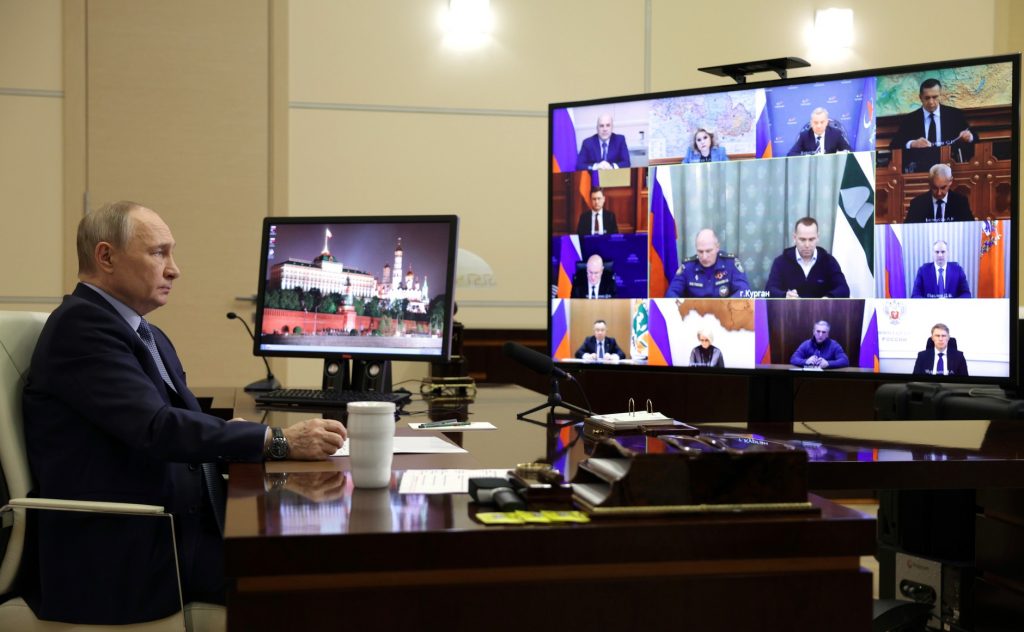
On Wednesday, April 17, Vladimir Putin held a meeting via videoconference with members of the Russian government. According to official data, the main topic of the meeting was the introduction of domestic software in economic sectors. At the same time, at the beginning of the meeting, Putin heard reports from the heads of relevant ministries and departments on the flood situation in some areas of the country. Also, the Head of Roscosmos, Yuri Borisov, made a separate report, which reported on the launch of the Angara intercontinental rocket.
Key theses:
- Kurenkov (Minister of Civil Defense, Emergency Situations and Disaster Relief): “In several constituent entities of the Russian Federation, an unfavourable situation is developing due to the passage of the spring flood. The situation in the Orenburg, Kurgan and Tyumen regions requires special attention. In the Orenburg region, we can confidently say that the flood wave passed through the cities of Orsk and Orenburg. Discharges from the Iriklinsky reservoir have become several times less than the values that were at the end of March – beginning of April. Although the water level in the cities I named is above dangerous, we note its steady decline.”
- Kurenkov: “The flood wave is moving downstream of the Ural River and approaching the village of Ilek on the border with Kazakhstan. The water level here has already reached dangerous levels. In advance, the forces of the territorial subsystem of the RSChS carried out a set of preventive measures, coastal defence structures were strengthened, and water-filling dams were deployed in certain areas.”
- Kurenkov: “Today, in the Orenburg region in 76 settlements and 45 SNT, more than 15 thousand residential buildings, almost 23 thousand household plots and 26 low-water bridges remain flooded. There are 1,031 people in 35 temporary accommodation centres, including 203 children. Medical workers, psychologists, employees of the Ministry of Internal Affairs and the National Guard are on duty at all sites. People receive hot meals, legal assistance and comprehensive support.”
- Kurenkov: “Particular attention is paid to information work with the population. People need to be told about payments and other support methods that they can receive, about the procedure for restoring documents, targeted humanitarian aid, vaccination and many other issues.”
- Kurenkov: “The Russian Ministry of Emergency Situations has deployed mobile information and warning systems to the region. The government of the Orenburg region has organised work to pay material assistance to the affected population who find themselves in the emergency zone. Thirty thousand people have already received financial assistance.”
- Kurenkov: “As for the Kurgan region, the flood wave came directly to the city of Kurgan. We expect maximum water levels in the coming days to reach 10 metres, an all-time high. In the Kurgan region, the number of houses and economic facilities damaged by floods is significantly less.”
- Kurenkov: “Today, in 25 settlements, more than 600 residential buildings and two thousand country houses, over 3.5 thousand personal plots, five low-water [bridges] and nine sections of highways remain flooded. The government of the Kurgan region has organised work to pay material assistance to the affected population who find themselves in the emergency zone.”
- Moor (Governor of the Tyumen Region): “On the Tobol River in the Tyumen Region, according to the marks of gauging stations, the water is not yet rising much, literally two or three centimetres, and in some, it is even decreasing. But we are certainly waiting for the wave coming to us from the Kurgan region in the coming days.”
- Moor: “The situation on the Ishim River is developing more dynamically. On Monday at 14:00 we received a new forecast from Roshydromet, which revised the maximum forecast water levels upward. Today, we expect approximately two meters to the historical maximums that were in 2017.”
- Moor: “For us, two meters is a lot because the topography of the Tyumen region in the area of the Ishim River is quite flat, and every centimetre of height provides a large flood area. During these two days, we sent many surveyors and “shot” all the heights in all populated areas. It turned out that the numbers – the number of settlements and houses that will fall into the flood zone – differ from the figures I reported to you. Therefore, the current figures are as follows: 101 settlements will be flooded instead of 51, affecting 6,387 households instead of 1,847, and about 17.5 thousand residents who live in these houses instead of the 7,300 I spoke about.”
- Moor: “We are actively working with the population, [holding] meetings in municipalities – Kazansky, Ishimsky district and the city of Ishim – which will be the first to meet this wave; active evacuation is already underway. We inundate people with text messages. Cars are driving, local authorities are actively working together with police officers and the Ministry of Emergency Situations. The task is to ensure that we evacuate the maximum number of people from the potential flooding zone in the coming days and even hours.”
- Novak (Deputy Prime Minister): “Vladimir Vladimirovich, to fulfil your instructions during the Address to the Federal Assembly, where you gave instructions to extend social gasification measures to garden partnerships located within the boundaries of gasified settlements, the Government of the Russian Federation has organised the corresponding work together with the regions, with Gazprom, with regional gas supply operators. According to a preliminary assessment, which was carried out jointly, the number of such SNTs today is about 22 thousand in populated areas with gas supply, and the number of households that could potentially connect to gas in them is about one and a half million.”
- Novak: “Three main criteria: households must be intended for permanent residence; land plots and residential buildings must be registered, that is, the owners must have ownership rights to these objects; and the third criterion – to carry out work on laying networks on the territory of gardening partnerships, a decision of the general meeting of SNT members will be required to provide public land plots for the placement of gas pipeline infrastructure on the territory of SNT.”
- Novak: “This year, Gazprom allocated unprecedented money for additional gasification – 270 billion rubles. In principle, there is funding. Agreements worth 260 billion rubles have already been concluded for general social additional gasification, of which 160 billion have already been financed.”
- Novak: “I would like to note the leading regions: today, in terms of quantity and quality of work, these are the Moscow region, the Chechen Republic, Lipetsk, Volgograd, Rostov regions, Orenburg region, and the Republic of Bashkortostan. This year, we have plans to additionally supply gas to about 300,000 households in accordance with our schedules.”
- Borisov (General Director of Roscosmos): “On April 9, on your instructions, we began flight design tests of the Angara-A5 heavy-class launch vehicle at the newly built launch complex of the Vostochny Cosmodrome. The tests are designed to eliminate all inevitable problems arising during the first launch and to work out all the necessary operational parameters.”
- Borisov: “On April 11 at 12 o’clock Moscow time, the rocket launched and completed all its tasks, as well as the Orion upper stage, created by the Rocket and Space Corporation (RSC) Energia to launch spacecraft into various target orbits, up to geostationary at an altitude of 36 thousand kilometers from the Earth.”
- Borisov: “It should be noted that the rocket is just beginning to gain its potential, but it is already obvious to us that it has excellent prospects. We have high hopes for the Angara at the Vostochny Cosmodrome. It is intended to replace the heavy Proton-M launch vehicle, over which it has several undeniable advantages.”
- Borisov: “Firstly, we cease to depend on geopolitical circumstances, having the opportunity to launch heavy rockets from our territory from two launch pads – in Plesetsk and Vostochny, while our Proton-M launch complex is located in Kazakhstan, at Baikonur. Secondly, the Angara-A5 engine uses more environmentally friendly kerosene, not heptyl, as on the Proton-M. Thirdly, Angara has a greater carrying capacity and significant potential for development. Today, the Angara family of missiles, developed and produced by the Khrunichev centre, includes two versions.”
- Borisov: “Another promising modification of this rocket is the Angara-A5B with an oxygen-hydrogen third stage, which ensures the launch of payloads weighing up to 38 tons into low Earth orbit. In the future, this launch vehicle will be used to send automatic interplanetary stations and devices for exploring the Solar System and deep space. Subject to continued funding for the work in sufficient quantities, flight tests of this launch vehicle are planned for 2030.”
Outcomes and outlook:
Putin indicates that the main challenges for the Government are technological modernisation and software independence as an opportunity to resist the introduction of new sanctions and espionage through Western (and Eastern) systems. In Russia, they believe that true sovereignty is possible only after the transition to its own information product, which will mean independence from global corporations that produce software. Russia also plans to sell its own software to “brotherly” countries. In this regard, there are significant problems, since after 2014 and 2022 there was a serious “brain drain” – the best specialists in the IT industry went abroad, and projects like Skolkovo are now going through hard times. Closer cooperation is expected with Belarus, which has achieved truly high results in the IT industry and is a recognised centre of intellectual development. This was due to the decrees of Alexander Lukashenko adopted in December 2017, stimulating the IT sector. Russia will try to introduce something similar soon. But there are many complaints against Maksut Shadayev, the Minister of Digital Development and Mass Communications of the Russian Federation. On the one hand, it is clear that he does not quite cope with the tasks assigned to him. On the other hand, he belongs to the more than influential “Tatar clan” surrounded by Putin – one of the most influential groups in the Russian Government.
The special attention paid to Yuri Borisov, the head of Roscosmos, is noteworthy. He is a man of Sergei Chemezov, the head of Rostec, and we can talk about strengthening the corporation’s position. In Moscow, they are talking about Borisov’s possible transition to a new position in the Government, but then the question arises of adequately replacing him in Roscosmos and whether a formal promotion will actually be a blow for Rostec and Chemezov.
It can be assumed that Putin will demand from the Government a technological breakthrough, which must be carried out within the next six years. However, the level of the Russian economy and the ongoing war in Ukraine will be a serious obstacle to implementing such plans.
- Meeting with the “head” of the occupied Autonomous Republic of Crimea
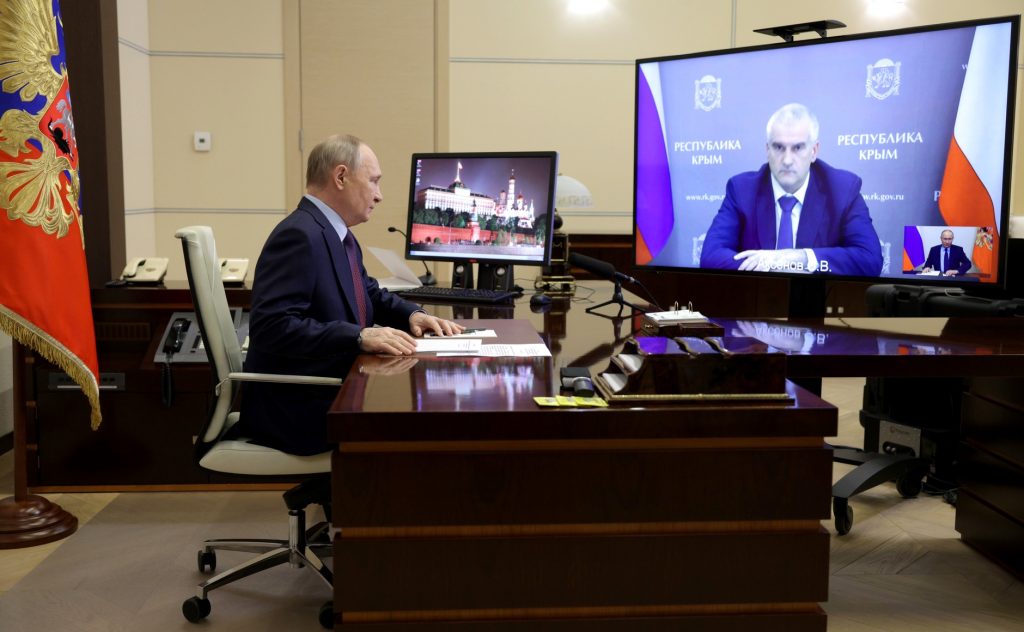
On Thursday, April 18, Vladimir Putin met via videoconference with Sergei Aksyonov, the “head” of the occupied Autonomous Republic of Crimea (Ukraine). According to official data, the main topic of the meeting was the socio-economic situation in the region. Also, during the meeting, Putin made it clear that the conversation about the current topic has been going on for a long time, and the meeting itself is only an official part of the dialogue.
Key theses:
- Putin: “Of course, like everywhere else, there are issues that require special attention. Nevertheless, the situation is stable and developing well. The economy is growing; construction is one of the engines of this economy. There are, I repeat, some questions, but I won’t go into details now. You know everything well; you know better. Please, where would you like to start?
- Aksyonov: “Of course, today, the whole country lives in the [so-called] “SMO.” First of all, for us, these are problems and concerns about the families of military personnel. Task number one is to support military personnel in all areas without exception. We have created social passports for the families of all military personnel. The work with the Defenders of the Fatherland Foundation is fully coordinated.”
- Aksyonov: “Today, 12 support measures are in effect in various areas. During this time, the Defenders of the Fatherland Foundation and the authorities received appeals from more than 10 thousand people who addressed questions of varying complexity. Decisions were made on almost all issues. For all of them, probably not; it’s impossible to say up to 5 per cent of the questions are in limbo. I personally coordinate this work once a week, delving into the situation and details. Nevertheless, there are no unsolvable issues, so in this case, we always thank the guys, we thank them, we remember them, we keep in direct contact, and we don’t leave them alone with their problems.”
- Aksyonov: “As for the economy, Vladimir Vladimirovich, we are moving forward. Over ten years, the gross regional product [has grown]: in 2023 it [was] 705 billion rubles, which is 3.7 times [higher than] compared to 2014. In principle, I will present all the figures based on the results of the decade. Our income increased from 18 billion in 2014 to 103 billion by 2023, more than five times. Regarding economic growth, the Republic of Crimea currently ranks third overall in the Russian Federation in terms of growth rate.”
- Aksyonov: “Energy. For gasification, our coefficient was 66 per cent at the start of 2014 and 82.5 [per cent] today. As part of your instructions for additional gasification, 13.5 thousand connections of houses to gas supply networks have already been completed, and another 5 thousand will be completed this year. We are moving according to the program; there are no delays in the program.”
- Aksyonov: “By education. The queue for kindergartens has been completely eliminated, 163 new kindergartens have been built on your instructions, and nine new schools have been built. Construction projects still in the program have been approved using the money you pledged, and accordingly, you gave such an instruction. We have 12 more schools under construction. There are plans to coordinate with the Government, based on your Address to the Federal Assembly, [the construction of] 10 more schools. We will prepare documents for construction, but based on the amount of funding that will be allocated on your instructions, we will adjust the plans, which will allow us to avoid the second shift almost entirely.”
- Aksyonov: “On healthcare. Vladimir Vladimirovich, we have over 2 thousand healthcare facilities. More than 900 objects have undergone complete and partial repairs. Two hundred seventy-three first aid stations and outpatient clinics have been built. Forty-six new ambulance substations were built, and over 200 ambulances were received. That is, there has been an almost complete re-equipment of medicine in all respects.”
- Aksyonov: “On the resort sector, Vladimir Vladimirovich, in 10 years, we have had 61 million tourists. Of course, there are plus or minus assessment methods, but the order of the numbers is approximately the same.”
Outcomes and outlook:
Putin decided to once again emphasise that “Crimea is Russia.” However, according to available information, Putin intends to carry out personnel changes in the occupied Crimea, believing that within ten years, Crimea should get rid of those leaders who began their political careers even before the annexation. As long as Sergei Aksenov sits in the chair of the “head” of the Crimean Autonomy, Crimea itself will be perceived by the Russians as a temporarily occupied territory. Changing the head of the “republic” should symbolise strengthening the management vertical on the peninsula, the final solution to the “Crimean issue”. That is why the meeting with Aksyonov had the nature of a reporting action, which will most likely be followed by a change of management in Simferopol in the coming months.
- Meeting with permanent members of the Security Council
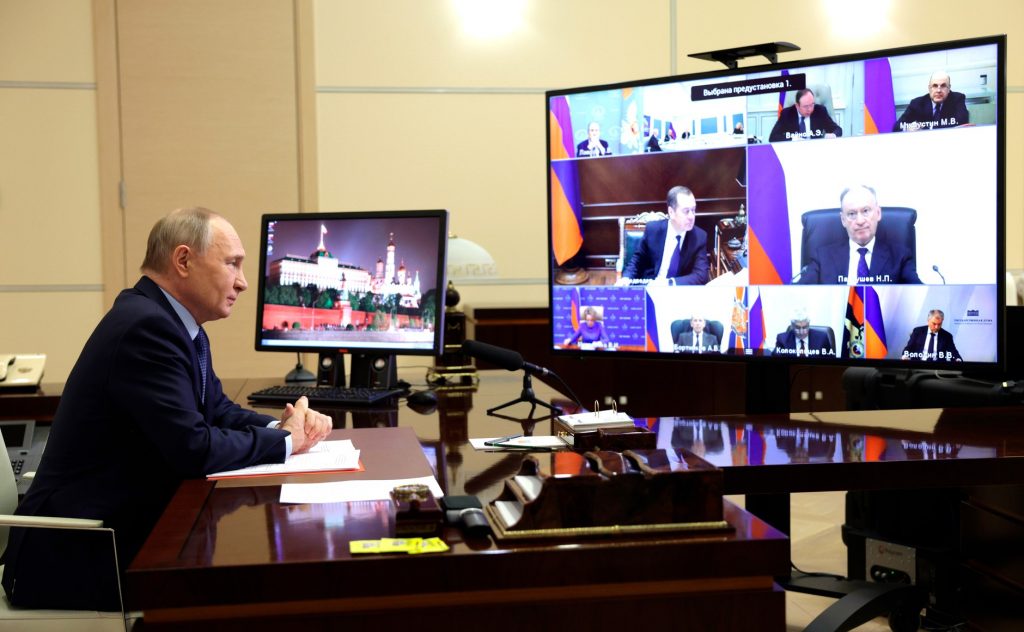
On Friday, April 19, Vladimir Putin held a traditional online meeting with permanent members of the Russian Security Council. According to official information, the primary topics of the meeting were state reserves, as well as measures to improve the provision of assistance to the population in the fight against the drug threat. One of the speakers was Dmitry Medvedev.
The meeting was also attended by Prime Minister Mikhail Mishustin, Chairman of the Federation Council Valentina Matvienko, Chairman of the State Duma Vyacheslav Volodin, Chief of the Presidential Administration Anton Vaino, Secretary of the Security Council Nikolai Patrushev, Minister of Internal Affairs Vladimir Kolokoltsev, Minister of Foreign Affairs Sergei Lavrov, Director of the Federal Security Service Alexander Bortnikov, as well as Deputy Prime Minister Tatyana Golikova, Deputy Prime Minister – Minister of Industry and Trade Denis Manturov, Minister of Finance Anton Siluanov and Head of the Federal Agency for State Reserves Dmitry Gogin.
Outcomes and outlook:
The next meeting with permanent members of the Security Council is the final touch before the change of Government, which will follow in early May (immediately after the inauguration of Vladimir Putin). That is why there was a need to hear information about the actual state of affairs in the economy and the situation with state reserves – that is, what the new Government of the Russian Federation will have to start working with. The fact that the report was entrusted to Dmitry Medvedev, one of the main enemies and opponents of Mikhail Mishustin, is significant. However, Medvedev failed to find compromising severe evidence, and the Security Council ended rather calmly and routinely.
- Interview with Sergei Lavrov
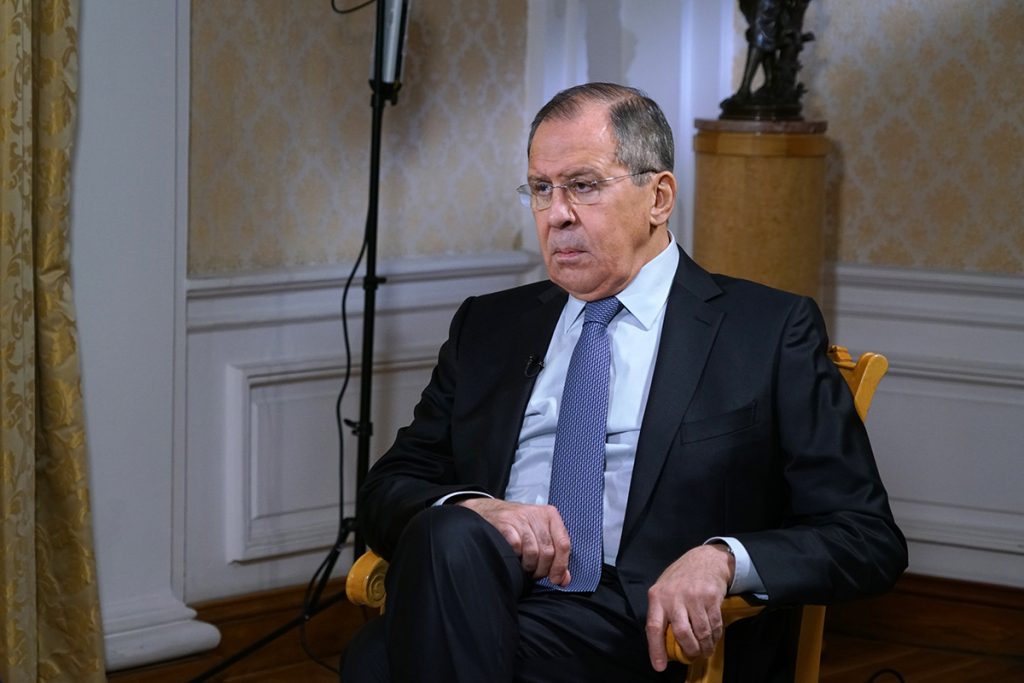
On Friday, April 19, Russian Foreign Minister Dmitry Medvedev gave an interview to three Russian radio stations at once: Sputnik, Moscow Speaks and Komsomolskaya Pravda. During the interview, the usual theses regarding geopolitics were voiced, and issues of international relations, communication with the West and the Ukrainian were also discussed.
Key theses:
- “Increasing the theme of defeating Russia, emphasising the existential significance of this defeat for the future of the West reflects not so much a belligerent mood as agony and hysteria. They don’t hide anymore. Former British Prime Minister Johnson said that if the West allows Russia to win, it will end their hegemony. This is a “confession” to the International Court of Justice for violating the Organization’s Charter’s main principle–states’ sovereign equality. The International Court should pay attention to this.”
- “In addition to fear for the loss of hegemony, they openly (perhaps without even suspecting it) make it clear that the United States is in charge. And everyone “lay down” under them. NATO Deputy Secretary General (Romanian) M. Joana recently said that the world is entering an era of fierce competition between the West on the one hand and Russia and China on the other. They say that Moscow, Beijing and everyone else are making attempts (to varying degrees, but increasingly) to undermine American power. The North Atlantic Alliance is not discussing Western or NATO but American power. Therefore, according to the Romanian deputy secretary general of the bloc, Washington needs its European allies. This is the raison d’être of NATO, as outlined by one of its main “spokesmen” and representatives. There are a huge number of such statements.”
- “Estonians, Lithuanians, and Latvians have moved to the forefront of “shaking their fingers at us” and saying they will send soldiers and fight. This demonstrates, to a certain extent, a significant evolution of NATO away from when the Americans and the Eurogrands had the final say. Now Poland, the Czech Republic, the Baltic states, and Bulgaria (lately under the current leadership) are “setting the tone.” Eurogrands have to live up to it. French President E. Macron nervously declares that French soldiers need to be sent. Then, someone explains that he was “misunderstood,” and he says that everything is correct. There is information that not only French mercenaries work in Ukraine, but also instructors (maybe under some kind of “roof”), along with other representatives of military and special services of European countries.”
- “Our line in this regard is simple and clear – the West did not want to negotiate honestly. We proposed a European security treaty in 2008 and 2009. There was one simple thing. The Istanbul Charter of 1999 stated at the highest level that security is indivisible. Countries choose their alliances voluntarily but do not have the right to do so if, by strengthening their own security, they undermine the security of others. It was expressly declared that all OSCE participants (presidents and prime ministers signed) undertake that no single country, a single group of states and not a single union in the Organization’s space will lay claim to dominance.”
- “Regarding the territorial side of the matter, Foreign Affairs published “memoirs” clearly aimed at justifying themselves the other day. Let me explain why. The magazine wrote that the United States and Britain told Zelensky not to sign the document. But allegedly not because they wanted to continue the war at the hands of the Ukrainians, exhaust the Russian Federation and destroy Russian civilians, but because they were wary when they saw that the proposal contained the formation of a group of guarantors of the security of Ukraine (with the participation of Russia, China and the West). There’s an amazing reason for this. They say they will sign, but suddenly, this agreement will not be fulfilled again, and someone will attack Ukraine. What if Russia itself does this? And then they, as guarantors of security, will have to fight with us. But they don’t want that. A winding logical path.”
- “Back to the negotiations. I would like to highlight an interesting point. Western countries cannot understand that if we are put in a situation where we supposedly need to be defeated, “strategically destroyed” as a global player, then we will not be afraid. They would really be scared if someone “took up arms” against them with the same rage, frenzy and amount of opportunities that still exist in the global economy. It strengthened us. Let them draw conclusions from this historical lesson if 250 years is not enough for them.”
- “We’ve passed Istanbul,” the West began not only to provide long-range weapons to the Ukrainians but also to help, with the help of Western military specialists, modernise many types of missiles, increasing their range. They began to fire these missiles at civilian targets as well. There was an episode when the Ukrainians tried to send drones with a large load of explosives to one of our strategic airfields. We have analysed the carrier has been upgraded to increase its range significantly. The blowing up of the Crimean Bridge is another example. This continued with Sevastopol, navigation in the Black Sea, merchant ships, and warships of the Black Sea Fleet. Not to mention Belgorod, Kursk and other terrorist attacks.”
- “We indicate readiness for negotiations not for the sake of a catchphrase. This is true. But conversations with V.A. Zelensky are pointless for many reasons. Its masters are concerned that they will lose their hegemony, which will be a geopolitical defeat for the West. J. Borrell said that it would be difficult for them to face such a defeat, and their reputation would be affected. It doesn’t cost anything to them. Here is an example of the Americans: after Vietnam, their reputation was “famous”; after Afghanistan, from where they escaped, too. Iraq, from where they are now being expelled. Syria, where they are subject to military pressure from various factions. Where have the Americans ever stayed?
- “The United States has already cooled down. I don’t know how the drama will end this weekend regarding considering three different bills, including Ukraine. Now, the most zealous advocates for continuing to “pump” Ukraine with money and weapons are the Europeans: German Chancellor O. Scholz, who considers himself a leader in assisting Ukraine, and the militant French President Emanuel Macron. Small countries—Baltic states, Czech Republic. Limitrophes.”
Outcomes and outlook:
Sergei Lavrov said literally nothing new but partially lifted the curtain on the negotiation process on the eve of the start of the Russian-Ukrainian war. In particular, Lavrov claims that Antony Blinken told him in January 2022 about the United States’ desire to deploy American medium-range missiles on Ukrainian territory and was ready to bargain not on the very fact of deployment but on the possible number of missiles. If this is the case, then Russia will soon appeal to this fact and try to convince more countries of the Global South of the justice of its aggression since it will present it as “protection of its national interests.”
- Discussion on the philosopher Ivan Ilyin
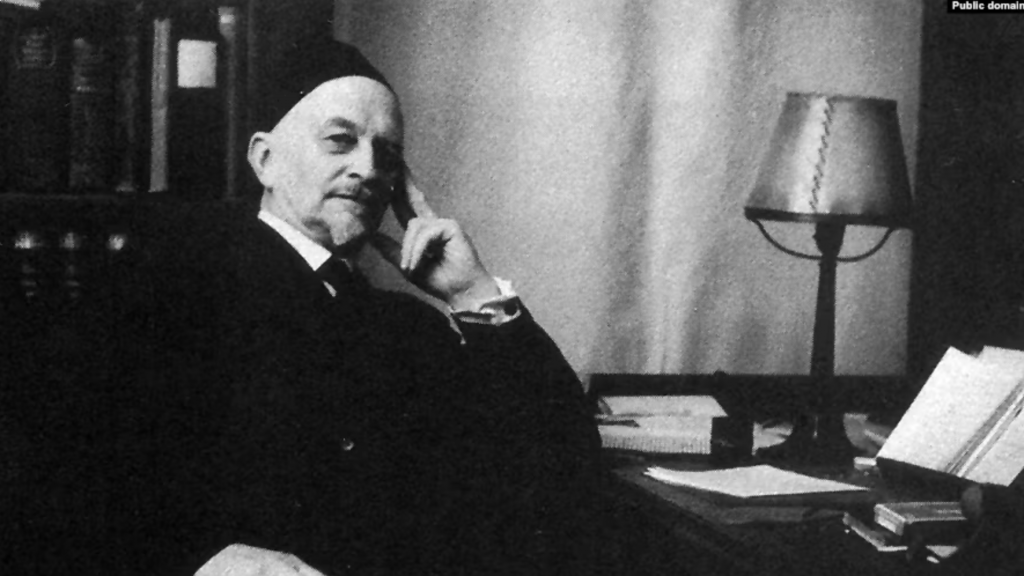
Last week in Russia, the discussion around the philosopher Ivan Ilyin and the school named after him, which was previously created on the basis of the Russian State Humanitarian University on the initiative of one of the Kremlin’s main ideologists, Alexander Dugin, was actively gaining momentum.
So, back on April 12, a petition appeared online, the authors of which called Ilyin a promoter of fascism who justified Hitler’s crimes. At the same time, Dugin reacted sharply to the petition: “The appearance of a petition against the name of the educational and scientific centre “Higher Political School named after. Ivan Ilyin” at the Russian State Humanitarian University (RGGU) is an operation of Western intelligence services, the purpose of which is to disunite the unity of the people of Russia.”
Ilyin himself is called the favourite philosopher of the Russian President. After the revolution, he, among others, was sent to Germany on the “philosophical ship.” Many observers note that in his views, Ilyin openly supported the policies of Hitler and Mussolini and also adhered to far-right ideology.
Other Russian politicians also responded to the petition scandal. In particular, State Duma Speaker Vyacheslav Volodin said that “discussions around the Higher Political School named after. Ilyina is part of university life. But we cannot turn them into political scandals and disputes.” In turn, Putin’s press secretary, Dmitry Peskov, said that the Kremlin does not want to continue this discussion and is becoming part of it: “We would not like to be part of this discussion. The President, indeed, repeatedly quoted Ilyin. And, in any case, we consider Dugin’s insults unacceptable.”
Outcomes and outlook:
The very situation around the name of Ivan Ilyin (undoubtedly a talented philosopher) shows that in Russia, which diligently seeks out manifestations of Nazism and collaborationism among other peoples of Eastern Europe, there are double standards: anyone who is familiar with the work and biography of Ilyin understands that Ilyin really for a long time he was an apologist for Hitler, fascism and Nazism, seeing in them creative, creative energy.
Ilyin also saw Nazi Germany as the main counterweight to the system of communist regimes. But in this case, a tolerant attitude towards Russia’s fascists should also imply a tolerant attitude towards representatives of other pro-fascist movements in Eastern Europe. And Ilyin’s philosophical genius in this regard is not an excuse. It is evident that today, the topic of sympathy for fascism in interwar Europe and the topic of studying this or that phenomenon in a historical context, and not from the position of current morality, has long required discussion.
In the West, there has long been a “quiet rehabilitation” of Ezra Pound, Knut Hamsun, Martin Heidegger, Gabriele d’Annunzio, Filippo Tommaso Marinetti and other cultural figures who had pro-fascist views. Post-Soviet countries will have to go through this. This equally applies to people with pro-communist views. The situation around Ilyin is the first sign of an ideological discussion that will inevitably occur in today’s Russia and will impact political processes soon. Ilyin’s rehabilitation will open the way to a rapid “recovery” of Russian society and the emergence of a “right-wing alternative” to the current regime.

